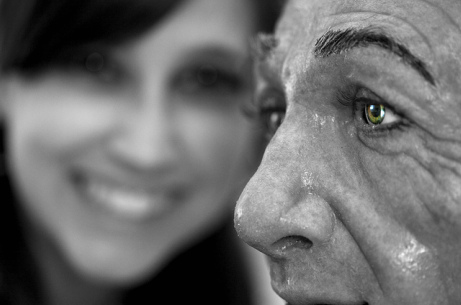
Andra Adams' research will help teach children with autism to identify facial expressions.
When computer scientist Andra Adams [2010] was offered the possibility of working with international autism expert Professor Simon Baron-Cohen she jumped at the chance.
The idea behind his research proposal was to create a wide range of facial expressions for a human-looking robot so that children with autism could overcome their fear and misunderstanding of others and feel less locked in their own world.
Since 2010, Canadian-born Andra has been working on a PhD in Computer Science with a robot named Charles, writing code to make his facial expressions as realistic as possible.
“Some of the common interventions for children with autism are behavioural. The children work with a therapist who tries to teach them emotion recognition. They are taught a few basic emotions and the facial expressions which show these, but these emotional expressions are not presented within a social context so the children are unable to read them in real life where they tend to be much more unpredictable and less obvious,” says Andra.
She adds that the Autism Research Centre hired actors to act out 412 different emotions, ranging from guilty to shameful to ecstatic. “There are so many different facial expressions. We want to have Charles show a wide range of expressions that is more accurate than previous attempts. Human facial expressions are very fleeting, but on a robot the children can play them again and again until they recognise them. I hope that this will allow children with autism to feel less afraid to look at the faces of others,” she states.
The final year of her PhD will involve working with autism researchers and children with autism as they use the robot to learn how to interpret different facial expressions.
Andra was inspired to do computer science by her family who encouraged her academic and scientific leanings. Her father is a seismologist for the Canadian government and her mother was a computer analyst.
At the University of Waterloo she studied software engineering. The course included a programme of six four-month internships so she spent her degree alternating between the world of work and the world of study.
Andra worked for a range of companies, including Google. Although her experience at Google was “one of my biggest personal growth experiences”, it also made her realise that she was more committed to an academic life. “In academia, you are your own boss and if it is your idea you are pursuing you can make a passionate case for it. If it is someone else’s idea that you are told to work on you might not necessarily put your heart and soul into it,” she says.
At Google, she had to work with a designer to make the compose email screen on Gmail for iPhones and Android phones more interactive. She says she had to learn how to manage the designer to find a compromise between what the designer wanted and what was possible time-wise in terms of programming so the project could be finished on schedule.
After graduating she began her PhD at Cambridge. She decided to head to the UK because of the emphasis on beginning research straight away in PhD programmes, unlike the large coursework component required in Canada and the US. Cambridge is one of the few UK universities that has a human-computer interaction group and Professor Peter Robinson, her supervisor at Cambridge, had a student who was working on ways to make robots more sociable. She emailed him and discovered that he was looking to work on autism-related robotics with Professor Baron-Cohen.
“It was a once in a lifetime opportunity,” says Andra.
Photo credit: Sir Cam.












